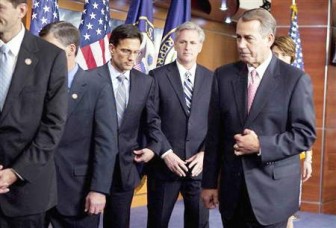WASHINGTON, (Reuters) – The House of Representatives yesterday approved a last-gasp deal to raise the U.S. borrowing limit in a decisive step toward averting a catastrophic debt default by the world’s largest economy.

A day before the deadline to lift the debt ceiling, the passage by the Republican-controlled House of the $2.1 trillion deficit-cutting plan hammered out over the weekend cleared the way for the Senate to approve it.
The Democratic-controlled Senate was due to vote on the bill at noon (1600 GMT) tomorrow and was widely expected to pass it. This would send it to the desk of President Barack Obama, who has said he is anxious to sign the bill.
The House vote of approval had been considered the biggest obstacle to a solution of the crisis.
It signaled the end was in sight to a months-long partisan battle that had deadlocked the political system of the United States, alarming its international allies, shaking financial markets and diminishing the U.S. global image.
The bill passed in the House by 269 votes to 161, well over the required majority. Democrats were evenly split on the bill — 95 for, 95 against — while 174 Republicans voted for the measure, with 66 opposing it.
Representative Gabrielle Giffords, an Arizona Democrat badly injured in a January shooting, made a surprise appearance on the House floor to vote for the bill, drawing applause. Giffords blew kisses and waved.
Up to the last minute, financial markets worldwide had been rattled by uncertainty over whether the compromise plan could pass the House in the face of objections from conservative Tea Party Republicans and liberal Democrats.
After the vote, House Speaker John Boehner, the top Republican in Congress, said the end result justified the often torturous months of negotiations. “The process works. It may not be pretty, but it works,” he told reporters.
Having a deal in place by today to raise the U.S. government’s $14.3 trillion borrowing limit will remove the risk of the United States not being able to borrow money to pay all of its bills.
There was little reaction in financial markets to the bill passing the House.
Earlier, the U.S. dollar fell against the Swiss franc to a new record low as investors flocked to assets considered safe, worried about a bleak outlook for the world economy and a possible cut to the United States’ triple-A credit rating.
Mohamed El-Erian, co-chief investment officer of PIMCO, which runs the world’s largest bond fund, said attention would now focus on a possible U.S. downgrade “and all the detrimental effects of weeks of political squabbles on household and corporate confidence, economic governance, growth, employment, inequality and America’s standing in the global economy.” Republican and Demo-cratic leaders had worked furiously to sell their rank-and-file on a deal reached with Obama in a bid to end an acrimonious impasse that has undermined Americans’ faith in their political institutions.
The compromise plan calls for spending cuts over 10 years but no new taxes, creates a powerful new congressional committee to recommend a deficit-reduction package by late November and raises the U.S. borrowing limit into 2013.
“LONG AND MESSY”
Obama and many lawmakers admitted the compromise deal reached was not perfect. But they stressed it was needed to avert a U.S. default debacle. “This has been a long and messy process and as with any compromise the outcome is far from satisfying,” Obama said in a video message to supporters issued by his 2012 re-election campaign. “But it has also launched an important debate about how we approach the big challenges we face.”
The political dysfunction in Washington has also dented America’s stature as the world’s capitalist superpower.
Russian Prime Minister Vladimir Putin, a frequent U.S. critic, accused America of living beyond its means “like a parasite” on the global economy and said dollar dominance was a threat to the financial markets.
It was hard to identify winners in the bitter fight that led up to the House vote yesterday. Obama had to accept deeper spending cuts than he wanted and will have to defend them to his liberal base during his campaign for re-election in 2012, but he could win points with moderates and independents he needs to win a second term.